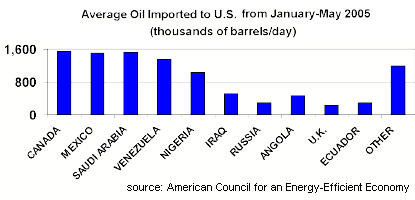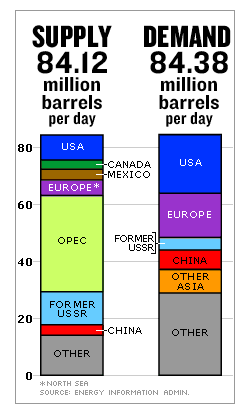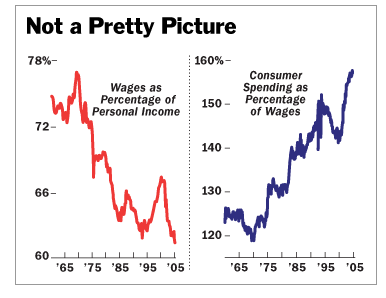

|
| weblog/wEssays archives | home | |
|
The (Hairless) Monkey Trap (June 13, 2007) Our U.K. Correspondent (now first among many) recently recommended a fascinating essay Faustus and the Monkey Trap (March 27, 2007) from a thought-provoking site. Here is an excerpt which describes The Monkey Trap and relates it to humanity's attempts to find a replacement for petroleum: Many centuries ago in southeast Asia, some clever soul figured out how to use the thinking patterns of monkeys to make a highly effective monkey trap. The trap is a gourd with a hole in one end just big enough for a monkey’s hand to fit in, and a stout rope connected to the other end, fastened to a stake in the ground. Into the gourd goes a piece of some local food prized by monkeys, large and solid enough that it can’t be shaken out of the gourd. 
Resource Analyst (and frequent contributor) U. Doran provided four excellent links which encapsulate Peak Oil and its many ramifications beyond energy consumption: Peak Oil: A Detailed and Transparent Analysis Crying Wolf or Crying Uncle Does our dependence on foreign energy and credit really matter? HIGH GASOLINE PRICES Part 1: Immediate Causes HIGH GASOLINE PRICES Part 2: Long-Term Factors You have probably heard that producing ethanol produces only a fraction more energy than the oil needed to produce, harvest and transport the corn, make the ethanol and then truck it to market. Furthermore, ethanol contains significantly less energy than gasoline, as this excerpt from the above story describes: It is a fact that ethanol only contains about 65% of the energy content of gasoline on a volumetric basis. Therefore, to displace the gross energy content of 1 gallon of gasoline requires 1/0.65, or 1.5 gallons of ethanol. What this means is that as ethanol is put into the gasoline pool, demand will go up simply because the pool now contains less energy.Gasoline has nearly the same energy density as TNT--meaning that substitutes for such a powerful, currently cheap and easily transportable energy are rare/non-existent. 
Here are two previous 2007 posts on Peak Oil/energy: Peak Oil: Denial Won't Fill Your Tank (April 12, 2007) The Future Shortage of Energy (May 22, 2007) Various "technological miracles" are constantly being touted as replacements for oil. One cheerleader favorite is Canadian oil shale/tar sands. But the maximum production capacity of the entire field, at the most optimistic, is 4 million barrels a day--less than 20% of the U.S.'s 21-million barrels a day oil habit. The rest of the world also uses energy--about 84+ million barrels a day. So the oil shale will at best replace less than 5% of the daily global demand for oil. So much for cheerleading "solutions." Now we hear about switchgrass as the "miracle feedstock" for ethanol. Wonderful, but nobody's figured out how to brew the stuff on an industrial scale. And even if the entire nation's corn crop were turned into ethanol (or replanted in switchgrass), the ethanol produced would replace at best about 10% of the nation's daily gasoline consumption. But perhaps The Monkey Trap extends to more than Peak Oil. 
Isn't our entire financial system based on an ever-increasing flood of debt and borrowing, as a nation, and as consumers? As our savings rate has plummeted to a negative number, there is no outcry or concern; The Hunter has yet to appear. As consumers have tapped their primary reserve of wealth, their home, to spend lavishly on luxury goods and travel, it seems we are close to extracting the food from the trap and going on our merry borrow-and-spend way. But alas, the trap is stronger than our fantasy that we can pay back debt by borrowing and spending more. The seed corn (home equity) is gone, and now that our hands are firmly stuck in the trap, The Hunter--in this case, the bond market--is finally approaching its prey. For more on this subject and a wide array of other topics, please visit my weblog. copyright © 2007 Charles Hugh Smith. All rights reserved in all media. I would be honored if you linked this wEssay to your site, or printed a copy for your own use. |
||
| weblog/wEssays | home |